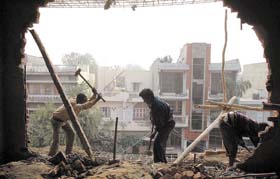Whose city is it anyway?
As the State is a soulless machine, it can never be weaned from violence to which it owes its very existence. -Mohandas K. Gandhi (1869-1948)
 "It is always a hard decision for a court to decline protection to a person who is likely to lose house and hearth. In such matters however, compassion is counter productive so far as public interests is concerned," Justice Vikramjit Sen observed while dismissing the petition.
"It is always a hard decision for a court to decline protection to a person who is likely to lose house and hearth. In such matters however, compassion is counter productive so far as public interests is concerned," Justice Vikramjit Sen observed while dismissing the petition.A person who has purchased an apartment constructed in flagrant violation of all building laws cannot insist on being served with a prior notice of demolition by the authorities, the Delhi High Court has ruled.
Even as the city crumbles under the bulldozing away of all principles of legal jurisprudence, the hapless victims of sheer abdication of civic planning and enforcement are resigned to such cavalier callousness as spitballed in this observation by the esteemed courts - "those who have decided to ignore the law can scarcely be heard to claim that natural justice has been violated by the authorities".
What kind of civil society would entrust its arbiters of justice with branding citizens as criminals after depriving them of their employment of last resorts? How many of the residents of this city can stake their rightful claim to the utopian pristine state that they foolishly hope to create from this necrosis? Will the malady be cured forever by these sporadic assertions of law and urban governance? Will the deliberate bleeding away of the indigenous means of livelihood of the city and its substitution by transplants of speculative capital sustain the "healthier lifestyles" of its plaining denizens?
The courts in their judicial adventurism have chosen to ignore the genesis of the problem- the artificial shortages manufactured through procedural bottlenecks which are in abject contravention of principles of urban planning.
The western concepts of urban planning that envisage suburban areas with silos of commercial and residential development are unwittingly being thrust upon an unwilling city. The colossal failure of the exercise of urban planning has erupted as excrescences of so-called illegal constructions or unauthorized land use. However to wield the scalpel to cure the city of this acne can not be condoned as a wise decision.
Delhi seems like an orphaned city with no sense of direction and no development plans in place. In the name of developmental plans Delhi has a rather sorry master plan 1971 that has been mutilated beyond recognition even by the government authorities. The courts have assumed the responsibility of "sanitizing" the city on the premise of such antediluvian laws that any success in achieving their targets would set the city back by 30 years.
The city is in dire need of reconstruction and civic authorities need to invest both in terms of planning and action to impart a positive direction to such efforts. So far their efforts have focused on compliance with the orders of powers that be. The apathy of the administrative machinery and its corrupt inefficiency is once again getting off the hook while judicial brutality is skewering the economy of the city with this over simplified exercise in law enforcement and urban deconstruction.

